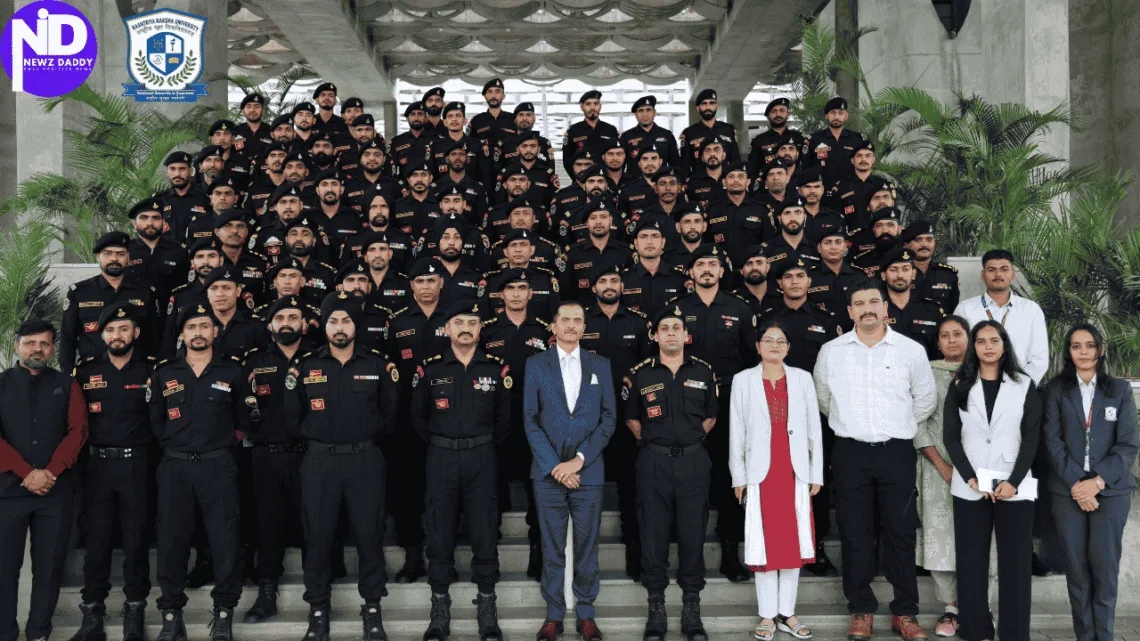RRU Opens Doors To NSG Delegation For Joint Projects
Newz Daddy Educational Updates
A delegation from the National Security Guard (NSG), comprising 79 officials led by Col. Lakshay Jain, Group Commander, Ahmedabad Hub, visited Rashtriya Raksha University (RRU) today. The visit aimed to foster the exchange of training and operational expertise, advance joint research & development, showcase innovations and enhance professional interaction between both institutions of the Ministry of Home Affairs.
The NSG, often called the “Black Cats,” is India’s elite counter-terrorism and hostage-rescue force. It was formed in 1984 after Operation Blue Star and the assassination of Prime Minister Indira Gandhi. With its reputation for handling the most critical threats, any collaboration between NSG and academic institutions like RRU is considered a vital step for strengthening national security.
During the visit, officials from RRU’s Atal Incubation Centre (AIC) presented their innovation, incubation and startup initiatives to the NSG delegation. This presentation highlighted RRU’s commitment to fostering a culture of entrepreneurship and technological advancement in the security domain.
AICs were launched across India under the Atal Innovation Mission by NITI Aayog to promote startups in science and technology. RRU’s AIC is unique because it focuses on defence, policing, and security startups. From smart surveillance systems to AI-driven crime detection tools, the centre is supporting young innovators who can provide practical solutions for national security challenges.
Concurrently, the School of Internal Security Defence and Strategic Studies at RRU showcased their drone training initiatives. They emphasised the critical importance and incremental use of drones in different walks of life, as well as in enhancing the livelihood opportunities and for officials in strengthening regional security. This underscores the growing recognition of drone technology’s role in modern security operations and the need for skilled personnel in this field.
Drones are now widely used not only for military operations but also for disaster management, agriculture, and traffic monitoring. In security, drones can be deployed for border surveillance, crowd control, and reconnaissance in risky zones. India has been actively pushing for drone training programs as part of its “Drone Shakti” mission to create more skilled pilots and expand drone-based services.
The exchange of knowledge and expertise during this visit is expected to pave the way for future collaborations between the NSG and RRU, ultimately contributing to the advancement of national security capabilities.
During their comprehensive tour, the NSG officials explored several key facilities at RRU. A notable stop was the Bharat Centre of Olympic Research and Education (BCORE), which is actively engaged in research and activities supporting India’s bid for the 2036 Olympic Games.
BCORE is one of the few centres in India dedicated to Olympic education, focusing on sports science, policy, and athlete development. With Ahmedabad being one of the proposed hosts for the 2036 Olympics, this research centre will play a key role in preparing India’s infrastructure and athletes for the global stage.
The delegation also showed keen interest in RRU’s Human Performance Lab. This state-of-the-art facility is designed to measure the performance of athletes and employees, identifying areas for improvement to enhance overall well-being and health.
Human Performance Labs are widely used by armies worldwide to study endurance, stress, and the physical limits of soldiers. By analysing movement, oxygen levels, and stamina, such labs help create training programs that improve performance and reduce injuries.
The visit further included the School of Internal Security and Smart Policing (SISSP), where innovative practices and training models for modern policing were highlighted.
Modern policing today is increasingly linked with technology, including predictive policing, data analytics, and cybercrime investigation. SISSP’s role is to prepare police forces to tackle digital crimes and smart city security challenges.
The School of Behavioural Sciences and Forensic Investigations (SBSFI) presented its work in psychological sciences and forensic research with applications for security and law enforcement.
Psychological profiling of criminals and forensic analysis of evidence are becoming crucial in solving complex crimes. Forensic psychology, in particular, is now a key part of counter-terrorism because it helps in interrogations and understanding extremist mindsets.
The School of Criminal Law and Military Law (SCLML) discussed programmes on the newly amended three criminal laws in Bharatiya Nyay Sanhita (BNS) as well as on economic and financial crimes.
The three new criminal laws — Bharatiya Nyay Sanhita, Bharatiya Nagarik Suraksha Sanhita, and Bharatiya Sakshya Adhiniyam — came into effect in 2025, replacing the colonial-era IPC, CrPC, and Evidence Act. Training on these laws is important for law enforcement agencies to smoothly transition into the new system.
Additionally, the NSG officials reviewed various IT- and forensics-related research projects being conducted at RRU, recognising their potential benefits for national security operations. This visit underscores a commitment to strengthening inter-institutional collaboration in critical areas of national importance.
During the visit, Prof. (Dr.) Bimal N. Patel, Vice Chancellor of RRU, expressed his strong interest in providing comprehensive support to the NSG. This support will encompass research, education and consultancy, enabling NSG officials to stay abreast of the latest trends and developments in technology.
Prof. Patel is an eminent figure in law and diplomacy, having served as a member of the International Law Commission of the United Nations. His leadership has helped RRU evolve into India’s premier security and police university.
Prof. Patel also highlighted the successful innovation and startup activities at the RRU-Atal Incubation Centre (AIC), emphasising their significant benefit to security personnel like those in the NSG. He further pledged the university’s unwavering commitment to providing technological and research-based assistance to the NSG whenever required.
This collaborative initiative underscores the commitment of both the NSG and Rashtriya Raksha University to enhancing national security through shared knowledge, advanced training, and cutting-edge technological advancements.






